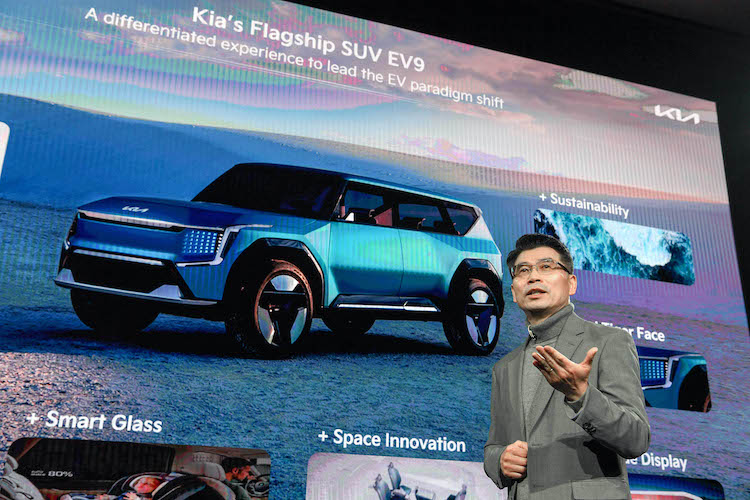
In a virtual announcement to investors Kia Corporation president and chief executive Ho Sung Song has confirmed the brand will build 14 new battery electric vehicles (BEV) including two new pickup models by 2027.
Starting in 2023, Kia plans to launch at least two BEVs per year and it will add a dedicated electric pickup truck, a strategic model for emerging markets, and an entry-level BEV to the future 14 BEV model line-up.
Kia is aiming for annual sales of 1.2 million BEV units by 2030.
It also wants to expand the application of connected car feature and autonomous driving technologies to all new vehicles; and become the number one brand in the global purpose-built vehicle (PBV) market by 2030.
Kia says its new flagship electric vehicle the EV9 is set for launch in 2023.
The five metre long Kia EV9 boasts acceleration of 0-100km/h in five seconds, and range of 540km on a full charge. It can also provide 100km driving range on a six-minute charge says the manufacturer.
The EV9 will also feature OTA (Over the Air) and FoD (Feature on Demand) services that will allow customers to selectively purchase software functions. In addition, it will be the first model to be equipped with Kia’s AutoMode autonomous driving technology.
Starting with 160,000 BEV sales this year, Kia aims to sell 807,000 units in 2026 and 1.2 million in 2030 – a 36% increase from the 2030 EV target announced during last year’s CEO Investor Day.
Kia projects that more than 80% of its BEV sales in 2030 will come from Korea, North America, Europe and China, with BEVs taking a 45% share of total Kia sales in these major markets.
To accommodate this expanding volume of EVs, the roles of individual production sites will evolve. Korea will serve as a global hub for research, development, production and supply of EVs, while other global production sites will produce strategic EVs for each market.
In Europe, small and medium-sized EVs will be produced from 2025. In the United States, where mid-sized SUVs and pickups are popular, electric versions of these models will be produced locally from 2024. In China, Kia plans to introduce mid-size electric vehicle models from next year, and India plans to produce entry and mid-size EV models from 2025.
Kia is planning to establish a battery supply and demand strategy and upgrade battery technology as demand is expected to increase significantly from 13GWh to 119GWh in 2030 due to increased EV sales.
It plans to supply batteries from the Indonesian battery cell joint venture and will simultaneously establish a stable battery supply and demand system by outsourcing to global battery companies.
The company plans to increase battery energy density by 50% by 2030 and reduce system costs by 40%.
Kia says will also focus on providing differentiated design for its products and expanding high performance model offerings. Beginning with the launch of the EV6 GT high performance model, it plans to expand the GT line-up to all BEV models.








